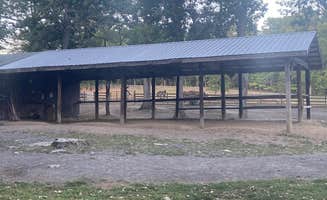Campsites near Charles Town, West Virginia range from horse-friendly facilities to primitive sites within a 45-minute drive. The area sits at the junction of the Shenandoah and Potomac rivers, creating diverse terrain with elevations between 400-1500 feet above sea level. Summer temperatures typically average 75-85°F with moderate humidity, while spring and fall camping seasons offer cooler conditions suitable for longer trail rides.
What to do
Trail riding with direct battlefield access: At Artillery Ridge Campground, campers can experience unique historical immersion. "Behind the campsite we stayed at, we learned connected to Stangler Farm, which served as a hospital for the wounded. Literally right outside the entrance of the campgrounds is where the battlefield starts," reports MJ B. The campground offers guided tours of Gettysburg battlefield on horseback.
Off-road vehicle exploration: The Cove Campground features extensive trail systems for ATVs and dirt bikes. "Several rustic campsites with a large lake for the kids, and miles of off road trails for atvs, jeeps, and dirtbikes," notes Jacob I. The property maintains varied terrain suitable for different skill levels, with access points clearly marked throughout the grounds.
Fishing in stocked ponds: Multiple campgrounds maintain fishing opportunities with no license required on private property. "My kids were able to fish for hours at the two fishing ponds, which both were stocked with bass and bluegill," explains Jason G. about his stay at Fort Valley Ranch. Some campgrounds also permit catch-and-release fishing in streams that run through the properties.
What campers like
Natural water features: Streams and ponds enhance the camping experience at several locations. "We were in tent sites which felt bigger than most and were right by river," shares Kelly J. about Gettysburg Campground. Water access provides natural cooling in summer months and creates habitat for wildlife viewing opportunities.
Clean facilities despite rustic settings: Most campers report surprisingly well-maintained amenities. "The bathrooms are also clean and have hot showers," notes Daniel S. about Bull Run Regional Park. Even during peak season, maintenance staff regularly service bathroom facilities and common areas.
Wildlife encounters: Unexpected animal interactions create memorable experiences. "Free range, friendly goats wander around, which is kinda fun," mentions Nancy L. about her stay at The Cove Campground. These unplanned wildlife sightings add entertainment value particularly appreciated by families with young children.
What you should know
Cell service limitations: Signal strength varies significantly between campgrounds and even between sites within the same property. "Cell service is minimal to nonexistent — not a big deal for most campers, but something to keep in mind," advises Karl S. about The Cove Campground. Download maps and information before arrival if planning to explore remote areas.
Drainage issues after rain: Some campgrounds experience water management problems during wet weather. "The mouths of the metal culverts in our loop were bent downward from campers driving over them, which obstructed the flow. Result was lots of standing water at our campsite," explains Stuart O. about his stay at Bull Run Regional Park. Pack extra tarps and choose elevated sites when possible.
Nut-dropping trees: Several campgrounds feature walnut trees that can create unexpected hazards. "One of the drawbacks of this campground is that a lot of the trees are black walnut trees and the squirrels do not shy away from dropping the walnuts like bombs on your head, car, or table when you're preparing breakfast," warns Dave G. about Camp Winery. Position tents and eating areas away from these trees when possible.
Tips for camping with families
Playground accessibility considerations: Not all recreation areas are conveniently located within campgrounds. "Only draw back is that there's only one playground that's awkwardly located," notes Yvonne B. about Bull Run Regional Park. Check playground proximity to your site when making reservations with children.
Fishing opportunities for kids: Stocked ponds provide reliable catches for young anglers. "My husband caught a fish first day in the pond behind our site," shares Justine I. about her stay at Artillery Ridge Campground. Most campgrounds provide fishing access without requiring additional permits or licenses when fishing within property boundaries.
Educational scavenger hunts: Some properties offer structured activities for children. "There are miles of trails and my gkids enjoyed the nature scavenger hunt. You even get a prize when you finish," reports Bridget H. after staying at Fort Valley Ranch. These organized activities provide entertainment during downtime between major excursions.
Tips from RVers
Site leveling requirements: Prepare for varied terrain when setting up. "My site had a slight slope, but was easily overcome using additional blocks on the low side to get the trailer level," reports Drew M. about Bull Run Regional Park. Bring extra leveling blocks even when sites are advertised as level.
Water hookup sharing challenges: Some campgrounds have limited water spigots that serve multiple sites. "There are 4 water spigots in camp 1. However all the travel trailers hooked up, which means you either had to make friends or disconnect their water in order to have access," explains Christopher K. about The Cove Campground. Pack extra hose lengths and splitters to accommodate shared water sources.
Access road conditions: Approach roads to some equestrian camping near Charles Town may present challenges. "The road is gravel and could use some work, I'd recommend 4x4 drive," advises Christopher K. Most campgrounds with equestrian facilities maintain suitable access for horse trailers, but recent weather can affect road quality.



